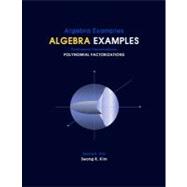Algebra Examples
, by Kim, Seong R.- ISBN: 9781466401921 | 1466401923
- Cover: Paperback
- Copyright: 9/12/2011
This book is about in fact, how to change or alter, convert, or modify expressions so that you can come up with the ones that you need, i.e. the solutions. And it is covered in two partial books as well as one book. The two partial books are as follows: ALGEBRA EXAMPLES POLYNOMIAL FACTORIZATIONS 1 (It covers polynomial arithmetic, all the basics on the factorizations, and examples.) ALGEBRA EXAMPLES POLYNOMIAL FACTORIZATIONS 2 (It covers more examples on the factorizations and more examples on algebra.) And both are available at amazon.com Why these examples though? You need the best teacher, so you need examples, because examples are the best teacher. All the examples here are fully worked out and detailed so that you can see and learn how some basic (and thus, important) tools in math are made, how they work, and how to work with them. What tools though? Among those math tools, we have numbers, constants and variables, polynomials and equations, functions and graphs, powers and logarithms, ratios and rates, trigonometry and geometry, lines and angles, triangles and circles, etc. Besides, we have formulas or identities on those tools, together with theorems, laws, etc. What then, are the tools for? Mostly, they are in fact, for your algebra. Doing algebra, you need to know what those tools are about & how they work so that you can work with them. Why algebra though? It's simply because you need to solve problems. Algebra connects problems to solutions. Algebra only can in fact, actually get you the ones you are always busy finding when taking exams, tests, and quizzes, and doing homework, too, of course. You've got to do algebra to get the very one you want so that you can put it down on your answer sheet. With algebra skill, together with your creativity, you can actually solve problems. And this book is in fact, about algebra, and you get it through examples, of course. Some examples may look too easy or too hard. It all depends on your skill of algebra. Whatever your skill may be though, you can grow your algebra if you follow the steps in each example. Each is detailed so that you can learn those tools fast, and increase your caliber quickly as well as properly. This book is however, nothing but a bunch of examples until you get it powered. How to get it powered, and make it run and work for you? Just read it, and then, do the examples in your writing. Do them yourself. Knowing only doesn't do. And in particular, this book is about polynomial factorizations, and explains how to manipulate polynomials, that is, how to change or alter, convert, or modify expressions so that you can come up with the ones that you need. The ones are solutions, of course. And that's what polynomial factorizations are about. This book does not just explain though. But also they do help follow steps to the solutions, and thus, help you do calculations with expressions so that you can actually do the calculation work doing those manipulations. With strong foundation of algebra, you can do a lot, and of course, can do problems very well, too. And while learning polynomial factorizations, that is, following steps in factorization processes, in other words, changing expressions or taking alternatives, you can grow much of your power in algebra. So this book will get you not only polynomial factorizations but enhancement of your algebra, too. You will thus, soon be able to change or alter, convert, or modify math expressions so that you can get to the solutions fast. And you will learn them all through examples detailed so that your math can run not only properly but fast enough, too. And more information on the book can be found at: http://www.runmath.com/BooksPrinted.htm






